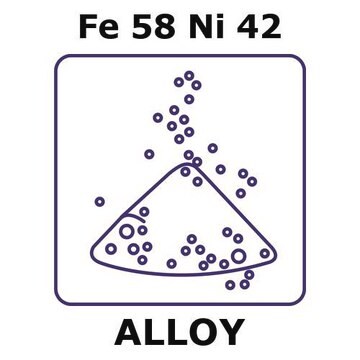577995
Nickel
nanopowder, <100 nm avg. part. size, ≥99% trace metals basis
Sinónimos:
Nickel nanoparticles
About This Item
Productos recomendados
Quality Level
assay
≥99% trace metals basis
form
nanopowder
resistivity
6.97 μΩ-cm, 20°C
avg. part. size
<100 nm
bp
2732 °C (lit.)
mp
1453 °C (lit.)
density
8.9 g/mL at 25 °C (lit.)
application(s)
battery manufacturing
SMILES string
[Ni]
InChI
1S/Ni
InChI key
PXHVJJICTQNCMI-UHFFFAOYSA-N
Categorías relacionadas
Application
- catalytic applications
- hydrogen transfer reactions
- contrasting agent in biological systems
signalword
Danger
hcodes
Hazard Classifications
Aquatic Chronic 3 - Carc. 2 - Skin Sens. 1 - STOT RE 1 Inhalation
target_organs
Lungs
Storage Class
4.1B - Flammable solid hazardous materials
wgk_germany
WGK 2
flash_point_f
Not applicable
flash_point_c
Not applicable
Elija entre una de las versiones más recientes:
¿Ya tiene este producto?
Encuentre la documentación para los productos que ha comprado recientemente en la Biblioteca de documentos.
Los clientes también vieron
Artículos
Currently, magnetic nanoparticles (MNPs) are attracting a lot of attention because of the possibility of many novel applications, especially in biomedical research.
Nickel transition metal and its complexes can be used as a catalyst in many synthetic transformations, like oxidative addition, C-H activation, reductive elimination, oxidative cyclization, oligomerization, and in cross-coupling reactions.
The application of magnetism and magnetic materials pervades our modern civilization in the form of electrical power, communications and information storage.
Magnetic materials permeate numerous daily activities in our lives. They are essential components of a diversity of products including hard drives that reliably store information on our computers, decorative magnets that keep the shopping list attached to the refrigerator door, electric bicycles that speed our commute to work, as well as wind turbines for conversion of wind energy to electrical power.
Global Trade Item Number
| Número de referencia del producto (SKU) | GTIN |
|---|---|
| 577995-5G | 4061832629018 |
Nuestro equipo de científicos tiene experiencia en todas las áreas de investigación: Ciencias de la vida, Ciencia de los materiales, Síntesis química, Cromatografía, Analítica y muchas otras.
Póngase en contacto con el Servicio técnico







